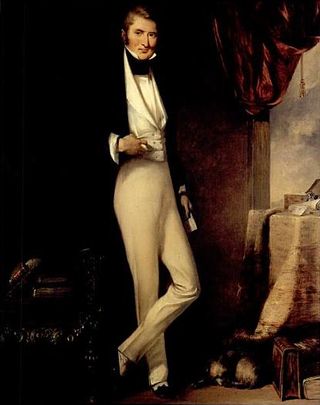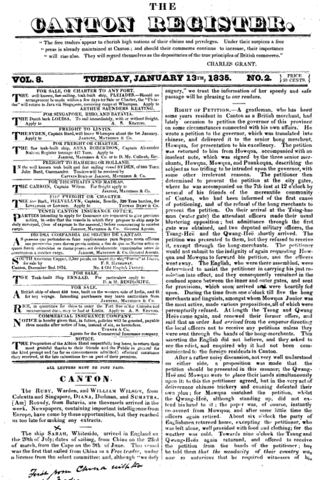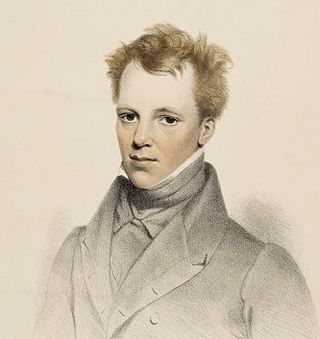| Company type | Agency House |
|---|---|
| Founded | 18th century in British India |
| Founders | James Mackillop and George Cruttenden |
| Headquarters | Fort William, India, Calcutta, , |
Area served | British India |
| Services | Trading and Banking |
Cruttenden, Mackillop and Company, Limited, often simply called Cruttenden and Co., was an agency house in British India founded by traders and merchants from Scotland.
The two founders of the agency house were James Mackillop and George Cruttenden. [1] [2] Mackillop's relative had previously been a partner at the agency house of Palmer and Company. [3] He later founded the agency house by the name of Cruttenden, Mackillop and Company in Kolkata. [4] One of the notable employees of the Cruttenden, Mackillop and Company agency house was Benjamin Wolff who was able to get rich from the indigo trade of British India. [5]
Like many other agency houses of the time, the main business of Cruttenden, Mackillop and Company was the sale and export of commodities such as indigo. [6] Cruttenden Mackillop & Co. also tendered the ship Sourabaya for the conveyance of iron. In 1816 private tonnage had to be arranged through the agency houses of Calcutta for the conveyance of 10,000 bags of need to the settlement. [7]
During its peak, Cruttenden and Co. was among the five largest agency houses in British India. [8] [9] [7]
The Cruttenden, Mackillop and Co. agency house failed in January 1834 due to major economic downturn affecting the British India. [10] The main cause of the economic crisis was the unexpected fall in the prices of commodities such as Indigo. [7]
The legacy of Cruttenden and Co. and its role in shaping the economic fortunes of India have been widely recognized. It has been credited as a major pioneer in the history of banking in India. [7]
The failure of the early Indian financial firms also led to the passing of the Companies Act, 1860 which granted limited liability to banking companies. Many of the early Indian banks had been partnership firms with unlimited liability. [7]

William Jardine was a Scottish opium trader and physician who co-founded the Hong Kong based conglomerate Jardine, Matheson & Co. Educated in medicine at the University of Edinburgh, in 1802 Jardine obtained a diploma from the Royal College of Surgeons of Edinburgh. The next year, he became a surgeon's mate aboard the Brunswick belonging to the East India Company, and set sail for India. In May 1817, he abandoned medicine for trade.

Dent & Co. or Dent's, was one of the wealthiest British merchant firms, or Hongs, active in China during the 19th century. A direct rival to Jardine, Matheson & Co, together with Russell & Co., these three companies are recognised as the original Canton Hongs active in early Colonial Hong Kong.

The Canton Register was an English language newspaper founded by Scottish merchants James Matheson and his nephew Alexander together with Philadelphian William Wightman Wood, the first editor. First published in Canton on 8 November 1827 and printed every two weeks, it was one of China's first English-language newspapers. Over the years, the publication was renamed The Hongkong Register and changed ownership shortly before ceasing operation in late 1850's.
Sesostris Bank is a submerged bank or sunken atoll belonging to the Amindivi Subgroup of islands of the Union Territory of Lakshadweep, India, and has a distance of 1,800 km (1,100 mi) south of the city of Delhi.

John Abel Smith was a British Member of Parliament (MP) for Chichester and Midhurst.
HMS Curlew (1812) was a Royal Navy Cruizer class brig-sloop built by (William) Good & Co., at Bridport and launched in 1812. She served with the Navy for only 10 years. During the War of 1812 she sailed from Halifax and captured several American privateers. Her greatest moment was her role in the 1819 British occupation of Ras Al Khaimah, leading to the signature of the General Maritime Treaty of 1820, which established the Trucial States, today the United Arab Emirates. Curlew was sold in 1822 in Bombay. She then had a 13 or so year career as an opium runner for James Matheson, one of the founders of the firm Jardine Matheson.

Sylph was a clipper ship built at Sulkea, opposite Calcutta, in 1831 for the Parsi merchant Rustomjee Cowasjee. After her purchase by the Hong Kong-based merchant house Jardine Matheson, in 1833 Sylph set a speed record by sailing from Calcutta to Macao in 17 days, 17 hours. Her primary role was to transport opium between various ports in the Far East. She disappeared en route to Singapore in 1849.
Hollingworth Magniac (1786–1867) was a merchant and connoisseur of medieval art. He briefly ran the free trading firm of Magniac & Co. which was later to become Jardine, Matheson & Co., one of the largest trading houses in Asia during the 19th century.
Thomas Chay Beale was a Scottish merchant and diplomat operating in the East Asia during the 19th century. He was a Chevalier of the Legion of Honor and of the Portuguese Order of Christ.

Jardine, Matheson & Co., later Jardine, Matheson & Co., Ltd., forerunner of today's Jardine Matheson Holdings, was a Far Eastern company founded in 1832 by Scotsmen William Jardine and James Matheson as senior partners. Trafficking opium in Asia, while also trading cotton, tea, silk and a variety of other goods, from its early beginnings in Canton, in 1844 the firm established its head office in the new British colony of Hong Kong then proceeded to expand all along the China Coast.

Robert Thom was an English nineteenth century Chinese language translator and diplomat based in Canton who worked for the trading house Jardine, Matheson & Co. and was seconded to the British armed forces during the First Opium War (1839 – 1842). For his literary works Thom used Sloth as a nom de plume.

Jardine Matheson Holdings Limited is a Hong Kong-based, Bermuda-domiciled British multinational conglomerate. It has a primary listing on the London Stock Exchange and secondary listings on the Singapore Exchange and Bermuda Stock Exchange. The majority of its business interests are in Asia, and its subsidiaries include Jardine Pacific, Jardine Motors, Hongkong Land, Jardine Strategic Holdings, DFI Retail Group, Mandarin Oriental Hotel Group, Jardine Cycle & Carriage and Astra International. It set up the Jardine Scholarship in 1982 and Mindset, a mental health-focused charity, in 2002.
Jardine, Skinner and Company was a trading company based in Calcutta, India. It was founded in 1825, initially dealing in textiles. Later it branched out into opium, tea, timber and petroleum. The company was closely associated with Matheson & Company of London and Jardine Matheson & Co. of Hong Kong.
Matheson & Company was a London-based trading house closely associated with Jardine Matheson of Hong Kong and Jardine Skinner of Calcutta. It arranged finance and handled imports from those two companies of products such as tea, silk and jute. Matheson & Company also became involved in venture-capital, specializing in mining. The company was a member of the consortium that formed the Rio Tinto Company. After 1912 it became a subsidiary of Jardine Matheson.
Charles Edward Mangles (1798–1874) was an English businessman and Member of Parliament.
Alexander and Company, Limited, often simply called Alexander and Co., was an Agency House in British India founded by traders and merchants from Scotland. Alexander and Co. has made several pioneering contributions to the economy of India. Alexander and Co. was the promoter and founder of India's very first bank, the Bank of Hindostan.
Agency houses in British India were trading companies that arose in 17th and 18th century India during the rule of the British East India Company.
The Palmer and Company, Limited, often simply called Palmer and Co. was an Agency House in British India founded by John Horsley Palmer. Palmer and Co. was the largest Agency House in British India.

Benjamin Wolff was a Danish businessman, landowner and art collector. After twelve years in India (1817–1829) working for the English trade agency Cruttenden, Mackillop & Co., Wolff returned to Denmark as a wealthy man and acquired Engelholm Manor south of Copenhagen.